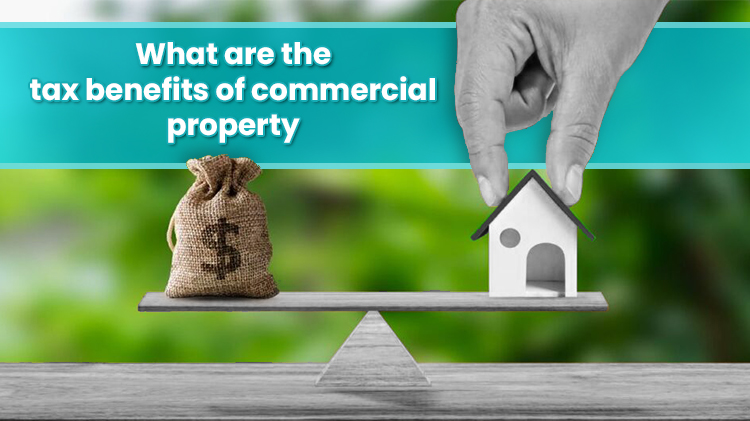Table of Contents
The tax benefits of buying a commercial property refer to the deductions and credits that a property owner can receive on their tax return as a result of owning and operating a commercial property. These benefits can include deductions for expenses related to the property such as mortgage interest, property taxes, repairs and maintenance, and depreciation. Additionally, bonus depreciation and Section 179 deductions may be available for qualifying commercial property purchases. The tax benefits of commercial property ownership can help reduce the property owner’s taxable income and result in significant tax savings. It’s important to consult with a tax professional to ensure that you’re taking advantage of all available tax benefits and complying with tax laws and regulations.
What are the Tax Benefits of Commercial Property?
There are a number of tax advantages to owning business property. Following are a few of the main tax advantages:
- Depreciation: With depreciation, owners of commercial real estate can subtract the cost of the asset over time. As a result, you are eligible to deduct a percentage of the property’s value from your taxes each year, which can help you pay less in taxable income.
- Mortgage Interest Deduction: If your commercial property is mortgaged, the interest you pay on the loan can be subtracted from your taxable income.
- Property taxes are deductible from taxable income if they were paid on a business property.
- Repairs and upkeep: You can deduct expenses for upkeep and repairs to your business property from your taxable income.
- Section 179 Deduction: Under Section 179 of the Internal Revenue Code, businesses can deduct the full cost of qualifying property, including commercial property, in the year it is purchased and placed in service.
- Opportunity Zones: If your commercial property is located in an Opportunity Zone, you may be eligible for tax benefits, such as deferral of capital gains taxes.
About the Tax Benefits of Commercial Property
Every person has a dream home since it is a location where they may live comfortably. Owning a piece of property allows one to realise their ambitions. Property that is exempt from taxes is a fantastic investment. They can prove to be a wise business choice and offer generous tax benefits. To purchase a property, you can quickly apply for a commercial store loan. This blog will go over all of the tax advantages that you may qualify for. Also, it will provide an outline of the commercial shop financing options for real estate purchases:
Standard Deduction
The tax advantages of purchasing a business property are not directly correlated with the standard deduction. No matter if you own commercial property or not, you can take the standard deduction from your taxable income. It is a set amount. Your filing status, as well as additional elements like age and blindness, affect the standard deduction amount.
The tax benefits of buying a commercial property are separate from the standard deduction and refer to the specific deductions and credits available to commercial property owners, such as those related to mortgage interest, property taxes, repairs and maintenance, depreciation, and Section 179 and bonus depreciation deductions. These tax benefits can help offset the costs of owning and operating a commercial property and reduce the property owner’s taxable income, resulting in potential tax savings.
Loan interest deduction
Loan interest deduction is one of the tax benefits of buying a commercial property. If you have a mortgage on your commercial property, you can deduct the interest paid on the loan from your taxable income. This deduction applies to both the principal and interest payments on the loan. The interest deduction can help reduce your taxable income, resulting in potential tax savings.
It’s important to note that there are limitations to the loan interest deduction. For instance, the deduction may be limited to the amount of interest paid during the tax year, and there may be restrictions on the amount of the deduction depending on the type and amount of the loan. Additionally, the loan must be secured by the commercial property in order to qualify for the deduction.
Using Commercial Property for your Business:
Using a commercial property for your business can offer several advantages, including:
- Control: Owning your own commercial property gives you greater control over the location and operation of your business. You can customize the property to suit your specific needs and make changes as necessary.
- Equity: Owning a commercial property can build equity in the property over time. As you pay down the mortgage, you build equity in the property, which can be a valuable asset for your business.
- Stability: Owning your own commercial property provides stability and security for your business. You don’t have to worry about rent increases or the landlord not renewing your lease, which can disrupt your operations.
- Tax benefits: As mentioned earlier, owning a commercial property can offer tax benefits such as deductions for mortgage interest, property taxes, depreciation, and repairs and maintenance.
- Investment: A commercial property can also be a good long-term investment for your business. If property values in the area increase, the value of your property may also increase over time, providing a potential return on investment.
Tax benefit on commercial property loan
You can get tax benefits on a commercial property loan. One of the main tax benefits of a commercial property loan is the interest deduction. You can deduct the interest paid on the loan from your taxable income, which can help reduce your tax liability. This applies to both the principal and interest payments on the loan.
Additionally, if you use the loan to make improvements to the property, you may be able to deduct those expenses as well. For example, if you take out a loan to make renovations or upgrades to the commercial property, those expenses may be deductible as a business expense.
Conclusion
The tax benefits of buying a commercial property can provide significant advantages for property owners. These benefits can include deductions for expenses such as mortgage interest, property taxes, repairs and maintenance, and depreciation. Additionally, bonus depreciation and Section 179 deductions may be available for qualifying commercial property purchases. The interest paid on a commercial property loan is also tax-deductible, which can help reduce your tax liability.
It’s important to note that the specific tax benefits of commercial property ownership can vary depending on factors such as the property’s location, size, and use. Additionally, tax laws and regulations can change frequently, so it’s important to consult with a tax professional to ensure that you’re taking advantage of all available tax benefits and complying with tax laws and regulations.
Overall, the tax benefits of commercial property ownership can help offset the costs of owning and operating a commercial property, reduce your taxable income, and result in potential tax savings.
You may also like: 7 Best Places to live in Noida with Family
FAQs
1. What tax deductions can I claim on my commercial property?
Some common tax deductions for commercial property owners include mortgage interest, property taxes, depreciation, repairs and maintenance, and operating expenses.
2. Can I claim depreciation on my commercial property?
Yes, you can claim depreciation on your commercial property. This allows you to deduct the cost of the property over a set number of years, which can help reduce your taxable income.
3. Can I deduct the cost of improvements made to my commercial property?
If you make improvements to your commercial property, such as adding a new roof or renovating the interior, you may be able to deduct those expenses as a business expense.
4. Are there any tax benefits for buying a new commercial property?
Yes, there may be tax benefits for buying a new commercial property. Bonus depreciation and Section 179 deductions may be available for qualifying commercial property purchases.
5. How do I determine the tax basis of my commercial property?
The tax basis of your commercial property is generally the purchase price plus any additional expenses incurred during the purchase process, such as closing costs and legal fees. You can also adjust the basis for any improvements made to the property and depreciation taken over the years.




